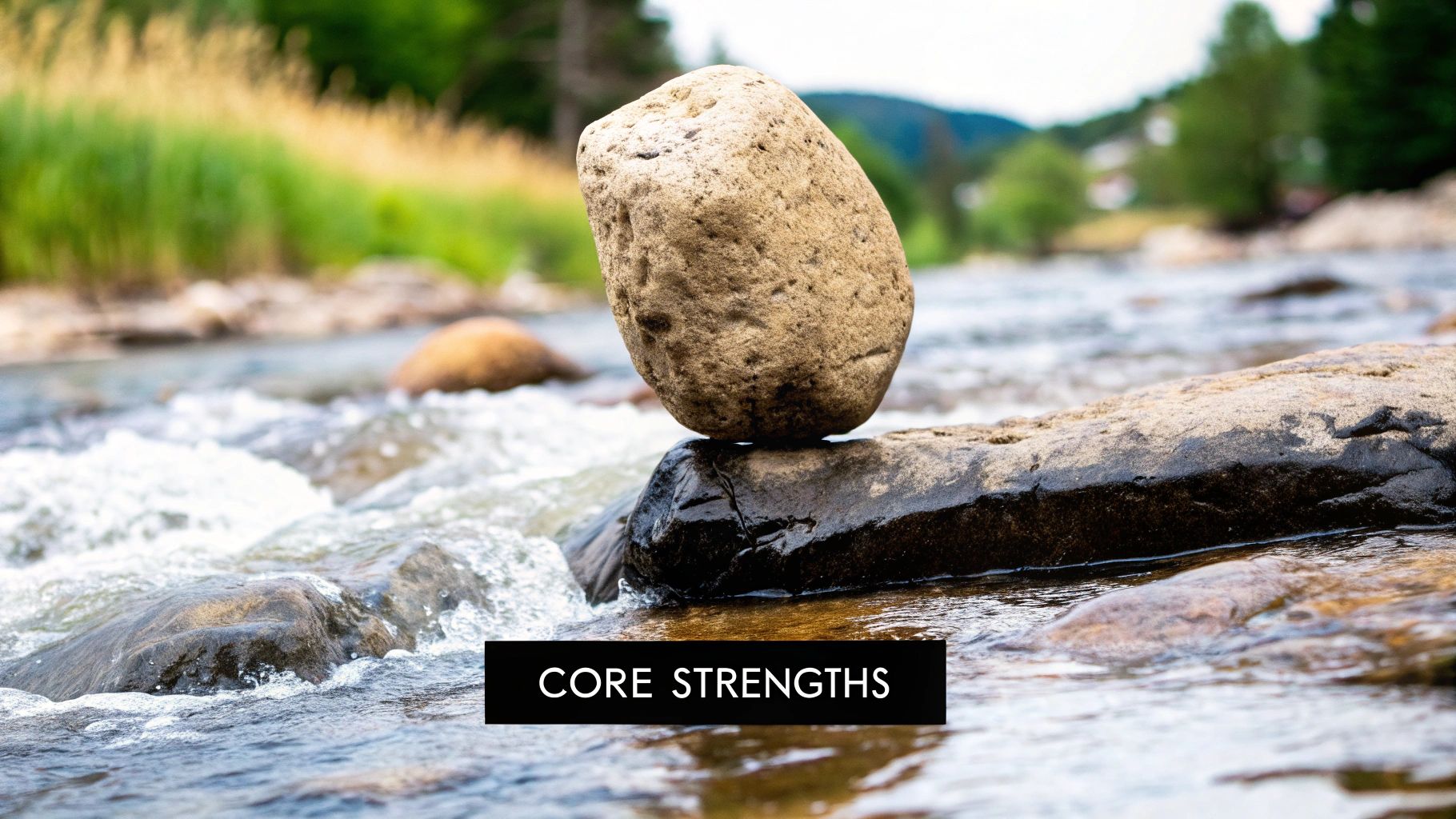Top Common Interview Questions and Answers for 2025

Walking into a job interview can feel like stepping onto a stage, where every answer shapes the outcome. While you can't predict every question, mastering the classics is the foundation of a confident performance. This guide breaks down the 10 most common interview questions and answers, moving beyond generic advice to provide strategic frameworks, expert tips, and actionable examples. We'll explore the 'why' behind each question, helping you craft authentic responses that highlight your unique value and align with the role's specific needs.
Instead of just memorizing scripts, you will learn how to structure your narratives effectively. We will cover everything from the dreaded "Tell me about yourself" to the forward-looking "Where do you see yourself in 5 years?" Each section provides a clear, concise strategy for developing compelling answers that showcase your skills and prove you are the best candidate for the position.
Whether you're a recent graduate or a seasoned professional, this curated list will equip you with the tools to navigate the interview process with poise and precision. Think of this not just as a list, but as a comprehensive playbook for turning predictable questions into powerful opportunities to make a lasting, positive impression on any hiring manager.
1. Tell me about yourself
This question is a classic icebreaker that sets the stage for the rest of the interview. It's your opportunity to deliver a powerful, concise professional summary that immediately highlights your value. A well-crafted response should be a 60-90 second "elevator pitch" connecting your experience directly to the role you're applying for.

How to Structure Your Answer
The most effective way to answer this common interview question is by using the Present-Past-Future formula. This structure keeps your answer focused, relevant, and engaging.
- Present: Start with your current role and a significant accomplishment. For example, a software developer might say, "Currently, I'm a Senior Developer at XYZ Corp, where I recently led the development of a new mobile app that increased user engagement by 20%."
- Past: Briefly mention previous experience that provides context and shows your growth. "Before this, I worked at ABC Tech, where I honed my skills in Python and cloud computing, contributing to a project that improved system efficiency by 15%."
- Future: Conclude by connecting your background to this specific opportunity. "I was excited to see this role because it aligns perfectly with my passion for building scalable solutions, and I'm eager to bring my expertise in mobile development to your team."
Just as you prepare your answer for 'Tell me about yourself,' ensuring your online professional summary is compelling is crucial. Tools like a LinkedIn Summary Generator can help you craft an impactful bio. By practicing this focused narrative, you demonstrate strong communication skills and prove you're a perfect fit from the very beginning.
2. Why do you want to work here?
This question probes your genuine interest and motivation, separating candidates who have done their homework from those who haven't. Your answer reveals your understanding of the company's mission, culture, and recent achievements. A thoughtful response demonstrates that you’ve specifically targeted this company and see a strong alignment between your career goals and their vision.

How to Structure Your Answer
The best way to tackle one of the most common interview questions and answers is to use a Company-Role-You structure. This framework helps you connect your personal ambitions with the company's objectives and the specifics of the role.
- Company: Start by showing you've researched them. For example, a marketing candidate might say, "I've been following your 'Go Green' initiative closely. Your company's commitment to sustainability is something I deeply admire and aligns with my personal values."
- Role: Connect your enthusiasm for the company to the specific position. "When I saw the opening for a Digital Marketing Manager, I was excited by the opportunity to apply my skills in SEO and content strategy to promote initiatives I truly believe in."
- You: Conclude by explaining how you see yourself contributing and growing. "I'm confident my background in leading successful campaigns can help amplify your message, and I am eager to grow my career with an innovative and mission-driven company like yours."
Crafting a personalized answer shows the interviewer you’re not just looking for any job; you're looking for this job. It proves you are invested, have done your research, and envision a future where you can make a meaningful contribution to their specific team.
3. What are your strengths?
This question is a direct invitation to align your best professional qualities with the needs of the employer. It's designed to assess your self-awareness and how well you understand the role's requirements. An effective answer goes beyond listing generic traits; it provides concrete evidence of your top skills in action.

How to Structure Your Answer
For this common interview question, a powerful technique is to select 2-3 key strengths and back them up with specific examples using the STAR method (Situation, Task, Action, Result). This approach transforms a simple claim into a compelling story of your capabilities.
- Identify Relevant Strengths: First, carefully review the job description to identify the most critical skills needed. Choose strengths that directly match these requirements, such as problem-solving, leadership, or a specific technical expertise.
- Provide Concrete Examples: For each strength, prepare a brief story. For instance, if your strength is problem-solving, you could say, "One of my key strengths is creative problem-solving. In my last role, we faced a recurring system bug that was causing significant downtime (Situation). My task was to find a permanent solution (Task). I analyzed the logs, identified the root cause in a third-party integration, and developed a custom script to handle the data discrepancy (Action). This eliminated the bug and reduced system downtime by 95% (Result)."
- Connect to the Role: Conclude by explicitly linking your strength to the future. "I'm confident I can apply this same problem-solving approach to optimize your systems and contribute to the team's goals."
This structured approach demonstrates not only what your strengths are but also how you have successfully applied them to deliver measurable value. It shows the interviewer you are a results-oriented candidate who understands what it takes to succeed in their organization.
4. What are your weaknesses?
This question is a classic test of self-awareness, honesty, and a commitment to professional development. Answering effectively involves sharing a genuine area for improvement while demonstrating a proactive approach to growth, turning a potential negative into a positive showcase of your character and work ethic.

How to Structure Your Answer
The best way to handle this common interview question is with the Weakness + Action + Result formula. This structure allows you to be authentic without raising red flags, emphasizing your commitment to continuous improvement.
- Weakness: Start by honestly identifying a real, but not critical, professional weakness. For example, a project manager might say, "In the past, I sometimes struggled with delegating smaller tasks, feeling I could get them done faster myself."
- Action: Immediately describe the concrete steps you have taken to address this weakness. "To overcome this, I took a management training course that focused on effective delegation and team empowerment. I also started using a project management tool to assign and track tasks more clearly."
- Result: Conclude by sharing the positive outcome of your efforts. "As a result, my team's engagement has increased, and I can now focus my energy on higher-level strategic planning, which has improved our project outcomes significantly. It’s an ongoing process, but I’ve seen great progress."
By using this approach, you demonstrate that you are not only aware of your areas for growth but are also dedicated to becoming a more effective professional. It shows maturity and a proactive mindset, which are highly valued by employers.
5. Where do you see yourself in 5 years?
This forward-looking question is designed to assess your career ambitions, foresight, and whether your long-term goals align with the company's potential growth paths. Hiring managers want to see that you have a realistic plan and that this role is a meaningful step in your professional journey, not just a temporary stop.
How to Structure Your Answer
A strong answer should demonstrate ambition, realism, and a clear connection to the company. The goal is to show how your personal growth will contribute to the organization's success over time.
- Show Alignment: Start by expressing your commitment to growing with the company. For example, "In five years, I hope to have become a true expert in this field and a key contributor to the team. I'm excited by the project management opportunities here, and I can see myself taking on greater leadership responsibilities for major initiatives."
- Focus on Growth and Skills: Instead of fixating on a specific job title, emphasize the skills and responsibilities you want to develop. "I aim to deepen my expertise in cloud architecture and perhaps even gain a certification in that area. I see myself mentoring junior developers and helping to drive the technical direction of future products."
- Connect to the Company's Future: Conclude by reiterating how your aspirations fit within their framework. "Ultimately, I want to be in a position where I can make a significant impact on the company's strategic goals. I believe this role provides the perfect foundation to build a long-term career here and contribute in a meaningful way."
By focusing on skill development and contributions rather than just titles, your answer to this common interview question will show you are a thoughtful, dedicated candidate invested in mutual success.
6. Why are you leaving your current job?
This question is a crucial test of your professionalism and motivation. Interviewers ask this to understand your career aspirations and to uncover any potential red flags, like poor performance or a negative attitude. Your goal is to provide a positive, forward-looking response that frames your departure as a step toward growth, not an escape from a bad situation.
How to Structure Your Answer
The key is to focus on the "pull" of the new opportunity rather than the "push" from your current role. Frame your answer around positive motivations and connect them directly to what this new company offers.
- Focus on Growth and Opportunity: Start by emphasizing your desire for new challenges or skills. For example, "I've gained valuable experience in my current role, but I'm looking for an opportunity to take on more leadership responsibilities and contribute to larger-scale projects, which this position offers."
- Align with Career Goals: Explain how this move fits into your long-term career plan. "My goal is to specialize in data analytics, and I was excited to see this role has a strong focus on that area, which isn't a primary function in my current position."
- Discuss Company or Role Fit: Mention why this specific company or role is attractive. "I've been following your company's work in sustainable technology and I'm eager to apply my skills to a mission I'm passionate about."
When answering this common interview question, never criticize your current or former employer, manager, or colleagues. Keep your explanation concise, positive, and focused on the future. This approach demonstrates maturity, self-awareness, and a genuine interest in the role you are interviewing for.
7. Describe a challenge you overcame
This behavioral question is designed to evaluate your problem-solving skills, resilience, and ability to learn from adversity. Hiring managers want to understand how you navigate difficult situations, think critically under pressure, and take ownership of outcomes. A strong answer provides concrete evidence of your capabilities and emotional intelligence.
How to Structure Your Answer
The best way to tackle this and other common interview questions of a behavioral nature is with the STAR method. This framework ensures your response is clear, concise, and impactful, showcasing not just what happened but how you drove a positive result.
- Situation: Briefly describe the context. Set the scene and provide necessary background information. For example, "In my previous role as a Project Manager, we were facing a tight deadline for a key client deliverable, but two critical team members left the company unexpectedly."
- Task: Explain what your specific responsibility was in that situation. "My task was to re-delegate responsibilities, adjust the project timeline, and manage client expectations to prevent any delays or loss of quality."
- Action: Detail the specific, proactive steps you took to address the challenge. "I immediately organized a team meeting to redistribute the workload, then personally trained two junior members on the new tasks. I also communicated transparently with the client, providing a revised but achievable delivery schedule."
- Result: Conclude by sharing the positive outcome of your actions. "As a result, we not only met the revised deadline but the client praised our proactive communication. The experience also helped upskill the junior team members, increasing our department's overall capacity for future projects."
8. Do you have any questions for us?
This final question is far more than a simple formality; it's a critical opportunity to demonstrate your genuine interest and engagement. How you respond reveals your level of preparation, critical thinking, and how seriously you are considering the role. Answering "no" can be interpreted as a lack of interest, so always come prepared to turn the tables and conduct your own mini-interview.
How to Structure Your Questions
Prepare a list of five to seven thoughtful questions in advance, focusing on areas that show you've done your research and are thinking long-term. Your goal is to gather information for your own decision while reinforcing your suitability for the role. Organize your inquiries around these key themes:
- The Role: Ask about the day-to-day responsibilities or the biggest challenges. For example, "What does a typical day look like in this role?" or "What are the most immediate projects I would be working on?"
- The Team: Inquire about team dynamics and collaboration. "Could you describe the team's structure and how we would collaborate on projects?" This shows you are a team player.
- Success and Growth: Ask about performance metrics and professional development. A great question is, "How is success measured for this position, and what opportunities are there for professional growth?"
- Company Culture: Probe into the company's values and work environment. "What do you enjoy most about working here?" or "How does the company support its values in day-to-day operations?"
By asking insightful questions, you end the interview on a high note, leaving a lasting impression of a proactive and thoughtful candidate. This is a crucial part of assessing common interview questions and answers, as it shows you view the interview as a two-way conversation.
9. What motivates you?
This question helps interviewers understand what drives you to perform at your best. They are trying to determine if your personal motivators align with the responsibilities of the role and the company's culture. A strong answer will go beyond surface-level desires and connect your intrinsic drive to tangible professional outcomes.
How to Structure Your Answer
The best approach is to focus on intrinsic motivators that are directly relevant to the job and support them with a brief, real-world example. This demonstrates self-awareness and shows how your drive translates into success.
- Identify a Core Motivator: Start by stating a key driver that aligns with the job description. For example, "I'm deeply motivated by solving complex problems and seeing the direct impact of my solutions." This works well for analytical or technical roles.
- Provide a Specific Example: Briefly illustrate how this motivation fueled a past achievement. "In my previous role, we faced a persistent system bug that was affecting user experience. I was driven to dig into the code, identify the root cause, and implement a fix that reduced customer support tickets by 30%."
- Connect to the Future Role: Conclude by tying your motivation to the company or position. "I'm excited about this opportunity because I know your team is tackling significant challenges in a growing market, and I'm eager to contribute my problem-solving skills to help you succeed."
By preparing a response that showcases your genuine drive and links it to the employer's needs, you effectively answer one of the more personal common interview questions and prove you are a self-motivated candidate who will thrive in their environment.
10. Tell me about a time you failed
This question is designed to assess your resilience, accountability, and ability to learn from mistakes. Interviewers want to see how you handle setbacks and if you can turn a negative experience into a positive growth opportunity. A strong answer demonstrates self-awareness and a commitment to professional development, making it a key part of behavioral interview questions and answers.
How to Structure Your Answer
The most effective way to address this question is by using the STAR (Situation, Task, Action, Result) method. This framework helps you tell a clear, compelling story about your experience.
- Situation: Briefly set the scene. Describe a specific professional challenge or project where things didn't go as planned. For example, "In a previous role, I was managing a product launch with a very aggressive deadline."
- Task: Explain your specific responsibilities in that situation. "My task was to coordinate with the marketing and development teams to ensure all launch assets were ready on time."
- Action: Detail the steps you took and where the failure occurred. Take ownership. "I relied too heavily on a single data source for our market analysis, which turned out to be inaccurate. This led us to target the wrong customer segment initially."
- Result: Conclude with the outcome and, most importantly, what you learned. "The initial campaign underperformed. I immediately owned the mistake, we re-analyzed the data with multiple sources, and pivoted our strategy. I learned the critical importance of data-validation and now implement a multi-source check for all major projects. This experience made me a more meticulous project manager."
By focusing on the lessons learned and the positive changes you implemented, you show the interviewer that you are a mature, reflective professional who can grow from failure.
Common Interview Questions: Key Responses Comparison
| Interview Question | Implementation Complexity 🔄 | Resource Requirements ⚡ | Expected Outcomes 📊 | Ideal Use Cases 💡 | Key Advantages ⭐ |
|---|---|---|---|---|---|
| Tell me about yourself | Low - simple open-ended format | Minimal - candidate preparation only | Initial impression, communication insight | Ice-breaker, set interview tone | Candidate controls narrative, highlights key qualifications |
| Why do you want to work here? | Medium - requires company research | Moderate - company info gathering | Assess cultural fit, interest level | Screening for genuine interest, company alignment | Differentiates candidates, shows enthusiasm |
| What are your strengths? | Medium - requires self-reflection | Moderate - preparation for examples | Measures self-awareness and fit | Identifying relevant qualifications, confidence | Highlights qualifications, supports with evidence |
| What are your weaknesses? | Medium - needs honest but strategic answers | Moderate - prep on growth areas | Tests maturity, honesty, growth mindset | Assessing coachability and professional development | Builds trust, shows self-improvement focus |
| Where do you see yourself in 5 years? | Medium - forward-looking, requires planning | Moderate - career goal research | Understands ambition and retention potential | Evaluating long-term fit and growth alignment | Reveals commitment, career planning skills |
| Why are you leaving your current job? | Low - straightforward but sensitive | Low - requires thoughtful framing | Understands motivation and professionalism | Exploring reasons for job change and stability | Shows maturity, explains career progression |
| Describe a challenge you overcame | High - behavioral, needs STAR method use | Moderate to high - detailed preparation | Demonstrates problem-solving and resilience | Behavioral assessment of skills under pressure | Provides concrete evidence, shows persistence |
| Do you have any questions for us? | Low - open-ended closing question | Minimal - preparation of questions | Shows genuine interest and engagement | Candidate-driven insight gathering and interview closure | Creates positive final impression |
| What motivates you? | Medium - introspective, needs alignment | Moderate - linking motivators to role | Reveals intrinsic drive and cultural fit | Assessing motivation and job satisfaction potential | Differentiates by personal values and fit |
| Tell me about a time you failed | High - behavioral, requires vulnerability | Moderate to high - preparation of examples | Tests resilience and learning from setbacks | Behavioral insight into accountability and maturity | Demonstrates growth mindset, professional maturity |
From Preparation to Offer: Your Next Steps
Navigating the landscape of common interview questions and answers is less about memorization and more about mastering a strategic communication framework. Throughout this guide, we've dissected the "why" behind each question, from the open-ended "Tell me about yourself" to the forward-looking "Where do you see yourself in five years?" The underlying theme is consistent: every question is an opportunity. It's a chance to connect your unique experiences, skills, and aspirations directly to the needs and culture of the company.
The true differentiator isn't having a perfect script, but developing a versatile storytelling ability. Your answer to "Describe a challenge you overcame" shouldn't just be a static tale; it should be a modular narrative you can adapt, emphasizing different skills like problem-solving for a technical role or resilience for a leadership position. This adaptability is your greatest asset.
Key Takeaways for Interview Success
To transform this knowledge into tangible results, focus on these core principles:
- Intent Over Answers: Always consider what the interviewer is really asking. "What are your weaknesses?" is a test of self-awareness, not a search for fatal flaws.
- The STAR Method is Your Anchor: For any behavioral question (like "Tell me about a time you failed"), the Situation, Task, Action, and Result method provides a clear, compelling, and concise structure to your stories.
- Authenticity Builds Connection: While preparation is vital, your personality must shine through. Let your genuine enthusiasm for the role and company be the thread that connects all your answers.
Your Actionable Roadmap
Mastering your responses to these common interview questions is just the beginning. The real work starts now, turning passive knowledge into active confidence.
- Create Your "Story Bank": Document at least five key professional accomplishments or experiences. For each one, outline it using the STAR method. This bank will become your primary resource for answering a wide range of behavioral questions.
- Conduct Mock Interviews: Practice is non-negotiable. Ask a friend, mentor, or career coach to run through these questions with you. Record yourself to analyze your tone, body language, and the clarity of your responses. The goal is to make your stories sound natural, not rehearsed.
- Perfect Your Post-Interview Communication: Your engagement doesn't end when you walk out the door. A thoughtful and professional follow-up can significantly impact the final decision. Reinforce your interest and reiterate your value by learning how to write a compelling follow-up email.
By internalizing these strategies and committing to deliberate practice, you move beyond simply answering questions. You begin to lead a conversation that showcases your value, proves your fit, and paves a direct path to a job offer. Your next interview isn't a hurdle to clear; it's a platform to launch the next stage of your career.
Ready to walk into your next interview with unshakable confidence? ParakeetAI provides real-time, AI-powered assistance, helping you craft perfectly tailored answers to even the toughest questions on the fly. Stop memorizing and start impressing by visiting ParakeetAI to transform your interview preparation.




